The bus bringing human traffic from Romania
- Published
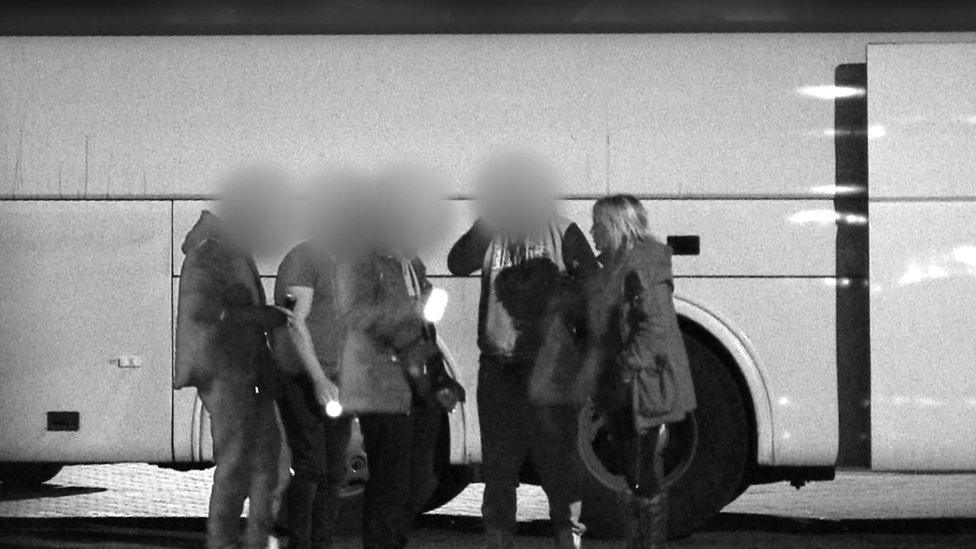
Reporter Sam Poling went undercover on the bus from Romania to Scotland
A BBC investigation - Humans for Sale - went undercover on a bus journey from Romania to the UK with people who could become prey to human traffickers.
As a journalist, there are some stories which simply never leave you. Strangely, it is rarely the story itself which leaves its mark. It is the people you meet along the way.
For me, it was a young Romanian man.
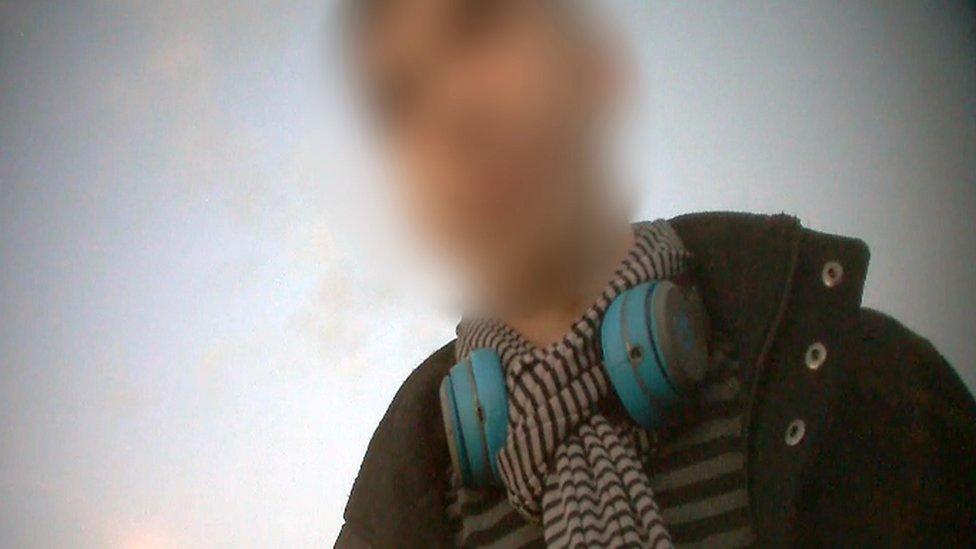
Sam never learned the name of the young Romanian she travelled with across seven countries
I never learned his name. I had travelled with him for three days across seven countries on a bus, in search of work.
We ate together and I laughed with him and watched him cry yet I never learned his name.
I had been investigating human trafficking and the supply chain between Eastern Europe and Scotland.
Romanian traffickers, I heard, were bringing victims over to the UK in such large numbers that they were now using every route possible to fulfil demand.
I was told a bus now ran three times a week from Bucharest to Glasgow.
A bus which traffickers had used to bring their victims over.
I heard the bus was full every week, nearly all those on board coming to the UK for work.
All willingly, it is just some may later discover they had been trafficked.
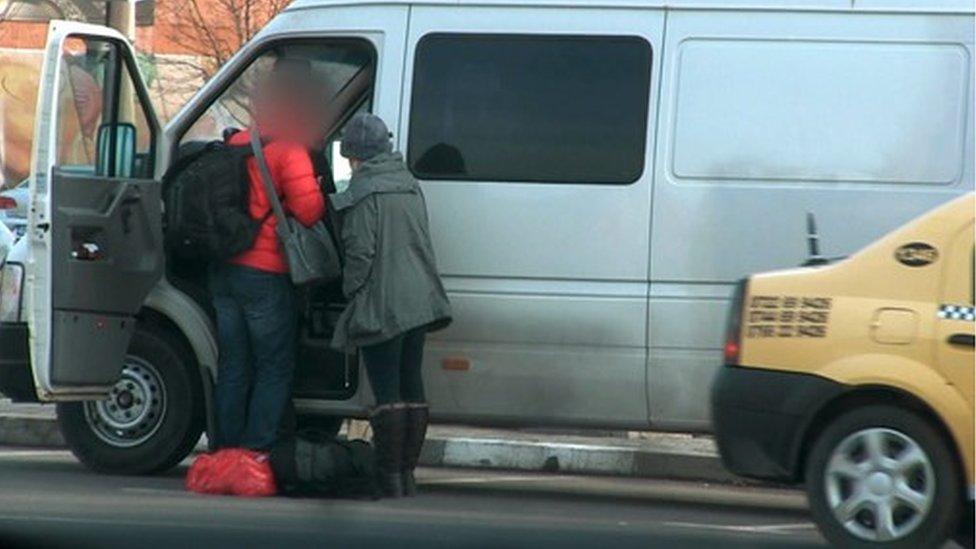
Sam got into a minibus in Bucharest to start her journey to the UK
If I wanted to understand the stories behind the people coming to the UK - by choice or otherwise - I knew I would have to get that bus, earn the trust of those on board and hope they would tell me what I wanted to know.
I knew it would be too dangerous to film openly as traffickers had used the route to bring their "merchandise" over, sometimes travelling with their victims to ensure their safe arrival.
So, armed with a small camcorder and a couple of covert ones, I headed to Bucharest.
The following morning I was taken by taxi to a car park on the outskirts of the city.
A minibus would pick me up from there, I was told, take me to the other side of Romania, where I would meet a long-distance coach which would take me to my destination.
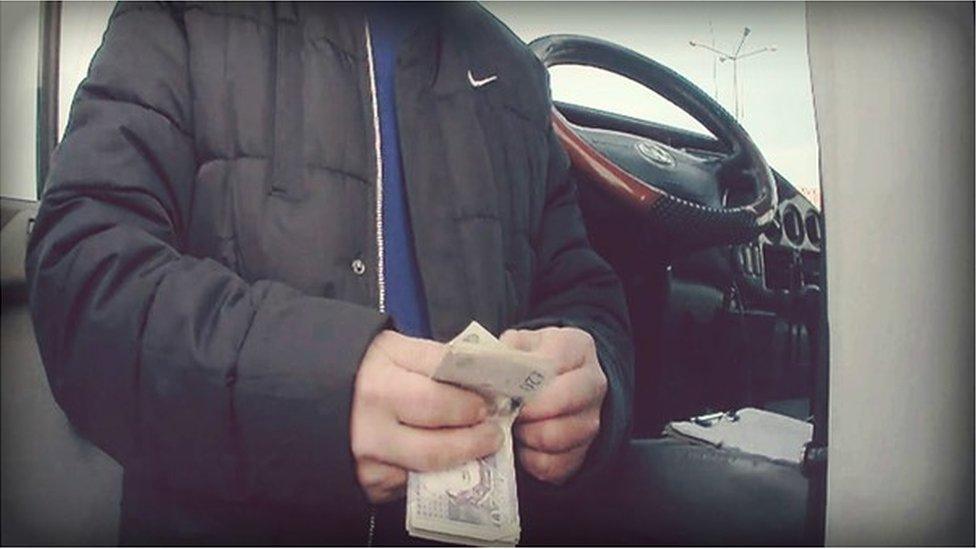
The minibus driver wanted £165 for a one-way ticket to Glasgow
The minibus driver wanted £165 from me for a one-way ticket to Glasgow. He insisted on being paid in pounds Sterling and told me they did this route three times a week.
I climbed inside the Transit van.
There were no windows in the back where I had to sit.
The handles had been removed from the inside of the doors, the driver told me it was because people kept trying to get out as it was travelling.
The next 10 hours were spent crossing Romania, stopping only to pick up people or parcels.
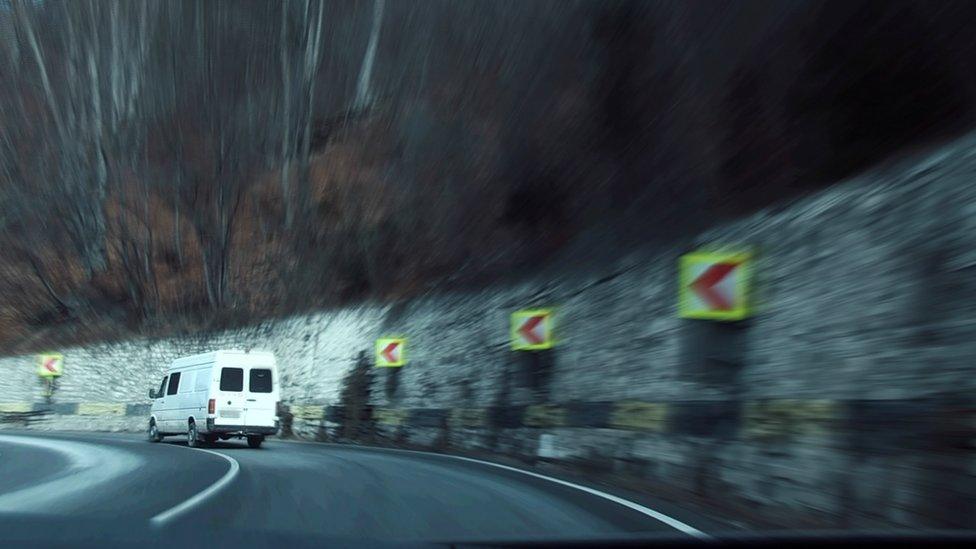
The minibus took Sam from Bucharest to meet a coach on the other side of Romania
I witnessed hundreds of pounds being passed over. Everyone I spoke to was taking this route for the first time.
The men were going to work in factories or vegetable fields, car washes or construction.
The women to work in hotels or care homes. Some to visit their husbands.
Eventually we arrived in Cluj on the east of the country where we were to board the coach which was to be our home for the next three days.
Waiting on its arrival was the first time I was able to speak with my fellow passengers.
The first group I spoke to were going to Leeds, Luton, Southampton and London.
Two were going to work in construction, one in a warehouse. The others in factories.
A man who was going to work in a car wash told me he would be working six or seven days a week, 11 hours a shift. For that he would be paid £40 per day.
He said: "It's very small eh? For a Romanian it is a very hard life here.
"You work for £7 per day. It is a hard life. Romania, Poland, Czech Republic, this is the problem, we work too much. But you have to understand life in Romania. In Romania you work for £7 per day.
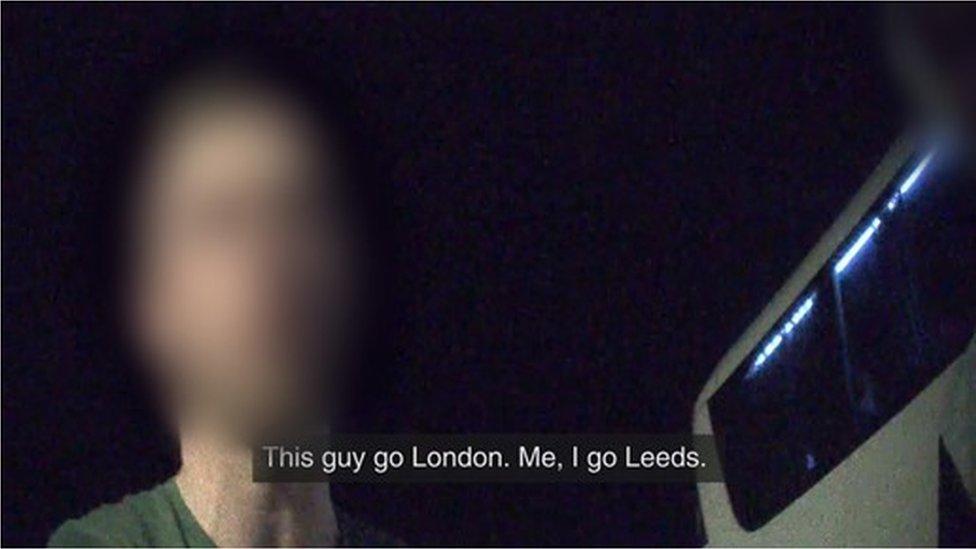
Passengers talked to Sam about their journey to the UK
"You have family, you have kids, so £7 is nothing. It's a very hard life."
A construction worker told me he too would be working six days a week, 10 hours a day. For that, he would get £200.
Others would be getting £3.50 an hour for vegetable picking.
Cramped and uncomfortable
Most were told that accommodation would be provided by the people who were offering the work.
They didn't know how many others they would be sharing with, although one man told me he suspected it would be many, as that was what had happened to others he knew who had come here before.
The bus arrived shortly before 10 that evening. It was already filled with passengers as I got on board.
I found an empty seat, it was cramped and uncomfortable.
There was a toilet we weren't allowed to use. There were two drivers who rotated shifts so that the bus could drive through the coming days and nights.
Loud music was played almost non-stop for the entire journey.
Surprisingly there was an on-board entertainment system - a screen at the front of the bus.
Even more surprisingly was the movie being played - Liam Neeson's "Taken", a film about human trafficking, albeit played mute with Romanian subtitles.
The first night was hard. There was a bad smash in front of the bus as we crossed through Hungary. One dead, others badly injured. I watched the body being covered with a blanket.
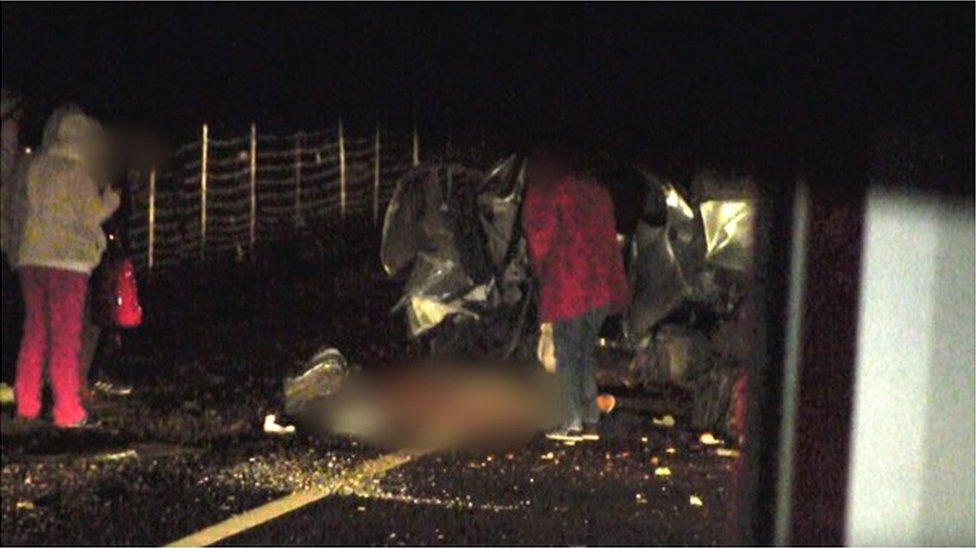
There was a crash on the road as the bus passed through Hungary
It was only when we stopped a few hours later that I was able to speak to other passengers.
One man was going to work in a factory.
He didn't know what his wage would be but said he had been to the UK before and paid a pittance.
He was only returning because any money earned in the UK would be more than what he would get back home in Romania.
Send money back
"Do you feel exploited?" I asked him.
"Yes, every day, yeah," he said.
The next passenger I spoke to was just 19. It was his first time away from home and he needed to work so he could send money back to his family.
He looked frightened and I asked if he was nervous. "A little", he told me.
He had been offered a job as a waiter near Crawley.
For a six-day week, 10 hours a day, he would be paid £118. For the week.
He would be put in a flat with others. He didn't know how many.
No experience
His English was almost perfect.
He told me: "In Romania I work in IT and now I am going to be a waiter. It's kind of a big deal. I have no experience."
He told me he had a cousin in the UK. I asked if he would be able to go to her for help if he needed.
"No", he said, "My family is broken and so I have no-one here."
We travelled onwards, through Hungary, Austria, Germany, the Netherlands, Belgium, France.
Each time we stopped, the young waiter would come and find me, talk to me about his life back home, his fear of being in the UK alone, and his sheer desperation at the situation he now found himself in.
He warned me when some of the men in the bus, bored with hassling each other, had started to target me sexually.
He would walk me to the toilets at the service stations so I wasn't alone. He told me about his family and became upset as the tiredness and reality of what he was doing began to take its toll.
Sam Poling watches as Romanian bus passengers board minibuses in the middle of the night near London
Finally, in the early hours of the third day, we crossed the Channel and were driven to a service station on the outskirts of London.
It was five in the morning and a number of minibuses were waiting for us all.
Like cattle, we were herded into different groups and told to get in the minibuses.
I went and sought out the young waiter in the darkness, to say goodbye. But he had already boarded his minibus and I watched it pull out of the service station and drive off into the night.
I got into the minibus bound for Scotland.
As we headed north, I wondered which of my travelling companions - already clearly being exploited in the UK - would find out they've been trafficked.
I hoped the young waiter wouldn't be one of them.
Humans for Sale is on BBC One Scotland at 21:00 on Wednesday 10 May